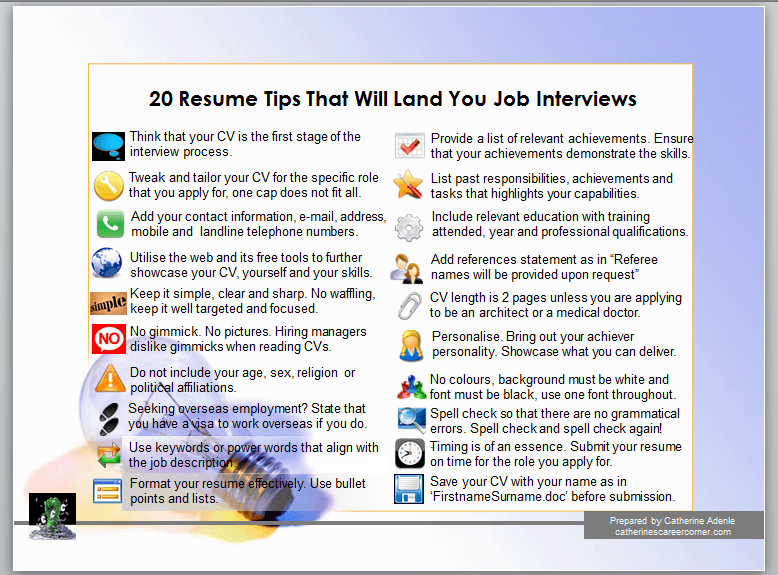Post Views: 22914 Views
Know 3 popular CV formats and know the right one for you. Your CV format must belong to one of these 3 popular CV formats. It’s easy to get confused about the format of your CV especially as there are so many different formats to choose from. Explore these 3 popular CV formats to know the right one for you.

By Catherine Adenle
As a job seeker, it’s important that you know these 3 popular CV formats. Putting together an effective CV is easy once you know how to do it. Once you know the right CV format to use, it’s a case of taking all your skills, achievements and job experience and tailoring them to the job you’re applying for.
However, how to format your CV or Resume is one of the most important primary decisions for you to make when you want to write an effective CV. If the format of your CV is not right, it will affect how you showcase your information in terms of skills, achievements, career highlights and qualifications.
The hiring manager has about ten seconds to quickly scan your CV, hence it is important that you draw him in so that he sees the most valuable piece of information first.
Here we explore 3 popular CV formats with reasons why you will use them and we have provided a sample of each of the 3 popular CV formats for you to tweak.
3 Popular CV Formats:
1. Chronological CV format
What?
This is the most popular CV format used by most job seekers and it’s the employers’ favourite.
Why?
- It emphasizes your career growth.
- It is easy to read for the hiring manager.
- It is clear and straightforward.
- Gaps are usually noticeable by you and the hiring manager.
- It lists your work history in reverse order from the most recent role or positions down to the oldest position within the last 5-10 years.
- It mainly focuses on employment dates, job titles/organization worked for, experience and education.
See Chronological CV format example
2. Functional CV format:
What?
This is used by graduates and people that have changed jobs several times with gaps gaping everywhere in the on their employment history.
A functional CV is also used by anyone looking to go back to work after they have taken some time off work (to take care of children, pursue personal interests, travel, looking to change career etc.).
The functional CV is also used by anyone simply entering the workforce for the very first time after graduation.
Why?
- Using this CV format helps you to focus more on what you can do, what your achievements are and your core competencies.
- It stresses more of what you can offer rather than the history of when you did the work.
- It outlines the value you can add to an organization by focusing more on your skills and less on your work history.
- It calls the hiring manager’s attention to your qualifications and achievements.
- It lists your qualification under relevant headings to show your areas of expertise, followed by your work history and education.
Functional CV format example
3. The Combined Format
What?
This CV format combines elements from both chronological and functional CV formats. Essentially, it allows the user to have the best of both worlds.
The combined format CV emphasizes skills and accomplishments with an equal emphasis on work history, employment dates and job titles.
Why?
- Using this CV format helps you when you need promotion in your current field or when you are changing your role but have some relevant skills for the new field.
- Allows you to focus on the experience you have in different areas that not related to the position you are applying for.
- It allows you to use the great features of the functional CV and the sharp focus of the chronological CV.
Combined CV format example
Tips for all 3 popular CV formats:
- Get the basics right
- Make it 2pp of A4.
- Always tailor your CV to the job you want
- Read the job description before you tailor your CV.
- Include all your contact details.
- Use bullet points and lay each point our clearly; it makes it easy for the hiring manager to notice and invite you for an interview.
- List skills, achievements, qualification, work experience and include dates.
- Allow enough white spaces in between your text, boxes and bullet points.
- Use relevant action verbs and keywords as requested via the job description.
- Get another person to check your CV and use a spell checker.
- Never include your photo, age, nationality, sex or religion.
See How to Write a Winning CV
See Trim the Fat Off Your CV: 25 Things to Take Out

Now that you have explored these 3 popular CV formats, know the right one for you, download the sample and use it to prepare your own CV.
Founder, Catherine's Career Corner. The career site empowering and inspiring ambitious candidates of all ages and professions to thrive and work smarter on their careers. Gladly helping all career-minded people worldwide to explore their career, manage change and understand how new technologies are changing and enhancing the future of work.